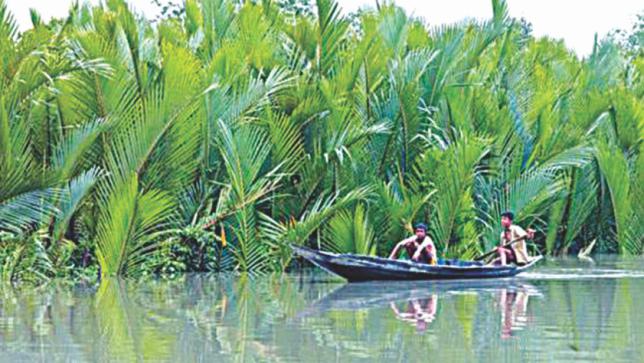Rampal fallout will be severe

Massive dredging of the rivers in and around the Sundarbans and transportation of coal for Rampal power plant would seriously affect the fish, wildlife and other aquatic resources in that region, scientists said in a new report. "Dredging and sediment disposal in estuarine and coastal waters such as the Sundarbans reserve forest and the Bay of Bengal will increase turbidity and sedimentation, affecting light availability for marine organisms," it said. It would affect the growth and survival of organisms living at deep under water and dolphins, fish and water birds, said the report titled "Critical Review of Shipping and Dredging Plans to Facilitate Coal Transport for the Coal-fired Power Plant at Rampal". Every week, eight to 16 ships would transport coal through the Sundarbans, and the coal would be loaded and unloaded at Akram Point. "Excessive sound and lighting will affect the aquatic life. As a result, they would move away," said agriculture and environment expert Prof Anwar Hossain of Bangladesh Agricultural University, while presenting the report yesterday. The National Committee for Saving the Sundarbans and Bangladesh Paribesh Andolon (BAPA) revealed the report findings at a press conference at the Prof Sirajul Islam Auditorium of Dhaka University. Dr William Kleindl, research faculty at Montana State University and The University of Montana, US, and Dr Jon Brodie, professional research fellow at ARC Centre of Excellence for Coral Reef Studies at the James Cook University, Australia, prepared the report free of cost early this year on request from the national committee. The scientists reviewed Bangladesh government's five documents, including the final report on environmental impact assessment (EIA) of Rampal power plant; consulting services on coal sourcing, transportation and handling; summary of EIA on dredging and feasibility study for dredging in the Passur river from Mongla Port to Rampal. Citing Bangladesh government reports, the review report said over 33 million tonnes of dredge spoil are proposed to be removed from the Bay of Bengal and Passur river to create channel for coal transport to the Rampal project site. In 2015, the World Heritage Committee had requested Bangladesh to conduct a separate EIA for dredging as it found the EIA for Rampal power plant inadequate with respect to the threats posed by dredging. Bangladesh government in August 2016 released two additional documents related to dredging, but those documents are not “independent, comprehensive or scientifically sound”, the review report said. "They do not meet the guidelines of the World Heritage Advice Note on environmental assessment, which includes rigorous environmental assessment early in the decision process," it said. The scientists in the report said Bangladesh government in one document claims the dredged spoil would be dumped into the upstream of Passur river, but in another document it said it would fill up the low land of Rampal plant area and build a dyke so the spoil does not go to the river again. The scientists, however, observed there are high potentials that the said low land would be flooded as the area is one metre higher than the sea level. Thus, it would pollute the river and underground water. On the other hand, as per the government documents, the 30 million tonnes of sediment removed between Akram Point and the Bay of Bengal would be dumped into the Bay of Bengal. This will put the aquatic ecology, dolphins and the Sundarbans under serious threat, Dr Anwar Hossain said. Unesco and International Union for Conservation of Nature recommended an effective action plan and emergency response facility to respond to shipping accidents. Bangladesh government claims it has adhered to the recommendations with the creation of National Oil Spill Contingency Plan, but “it does not reflect the reality,” said the report. "On January 13 this year, coal ship MV Aichgati sank at the mouth of the Passur river, spilling over 1000 tonnes of coal and hundreds of gallons of fuel oil adjacent to the Sundarbans. The government, however, has made no effort to date to remove the ship or spilled toxic fuels," said Prof Anwar Hossain.
Read More: http://www.thedailystar.net/frontpage/rampal-fallout-will-be-severe-1418422

